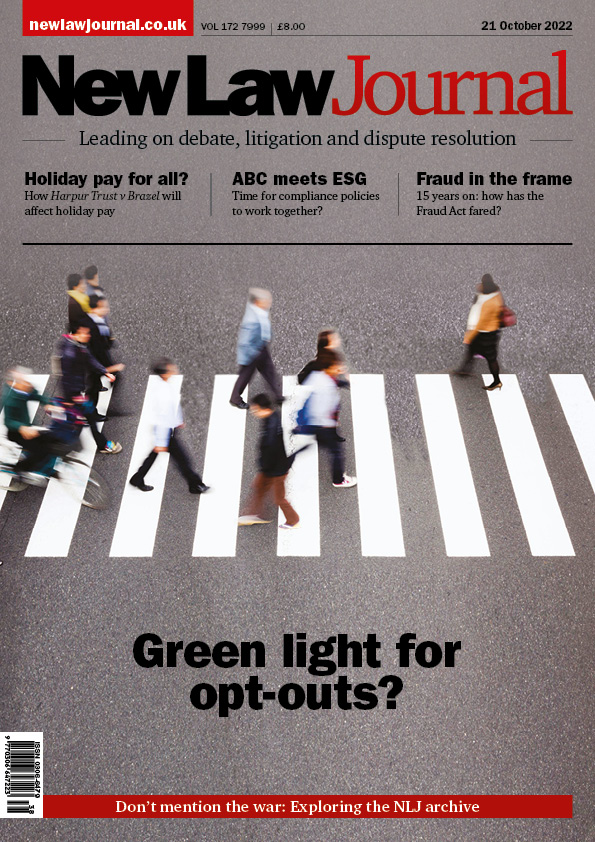THIS ISSUE

It’s been 15 years since the Fraud Act 2006 took effect, and the scale and types of fraud have changed considerably.
The question of how to calculate holiday pay for workers on variable hours has been addressed by the Supreme Court decision in Harpur Trust v Brazel.
They’re massive, big money, headline-grabbing and share-price rocking—and possibly coming to a court near you! At least, that’s if the Competition Appeal Tribunal (CAT) continues on its current path of greenlighting opt-out collective proceedings.
Recent incursions by the government into the rule of law and associated citizens’ freedoms have disturbing parallels in history, and should not be ignored, Geoffrey Bindman KC writes in this week’s NLJ.
With political divisions growing ever more pronounced, demonetisation is emerging as one of the principal weapons deployed to silence debate, argues David Locke
The Competition Appeal Tribunal’s desire to breathe life into the collective proceedings regime is clear from its CPO approval rate & reluctance to strike out or summarily dismiss claims: Cameron Laing assesses the impact of its approach thus far
Sarah King looks at the various scenarios and conundrums facing employers of workers on variable hours
15 years on, can the Fraud Act 2006 keep up with the pace of change? Stewart Hey & Abigail Rushton weigh up its successes & shortcomings
Can anti-bribery & corruption compliance programmes assist corporates with environmental, social & governance risks? Liam Naidoo & Kevin O’Connor consider the evidence
Stephen Gold discovers how the law was coping with war—and how lawyers were coping with its ending—as he dips into the 1943 and 1945 archives
MOVERS & SHAKERS

Jackson Lees Group—Jannina Barker, Laura Beattie & Catherine McCrindle
Firm promotes senior associate and team leader as wills, trusts and probate team expands

Asserson—Michael Francos-Downs
Manchester real estate finance practice welcomes legal director

McCarthy Denning—Harvey Knight & Martin Sandler
Financial services and regulatory offering boosted by partner hires
NEWS
Holiday lets may promise easy returns, but restrictive covenants can swiftly scupper plans. Writing in NLJ this week, Andrew Francis of Serle Court recounts how covenants limiting use to a ‘private dwelling house’ or ‘private residence’ have repeatedly defeated short-term letting schemes
Artificial intelligence (AI) is already embedded in the civil courts, but regulation lags behind practice. Writing in NLJ this week, Ben Roe of Baker McKenzie charts a landscape where AI assists with transcription, case management and document handling, yet raises acute concerns over evidence, advocacy and even judgment-writing
The Supreme Court has drawn a firm line under branding creativity in regulated markets. In Dairy UK Ltd v Oatly AB, it ruled that Oatly’s ‘post-milk generation’ trade mark unlawfully deployed a protected dairy designation. In NLJ this week, Asima Rana of DWF explains that the court prioritised ‘regulatory clarity over creative branding choices’, holding that ‘designation’ extends beyond product names to marketing slogans
From cat fouling to Part 36 brinkmanship, the latest 'Civil way' round-up is a reminder that procedural skirmishes can have sharp teeth. NLJ columnist Stephen Gold ranges across recent decisions with his customary wit
Digital loot may feel like property, but civil law is not always convinced. In NLJ this week, Paul Schwartfeger of 36 Stone and Nadia Latti of CMS examine fraud involving platform-controlled digital assets, from ‘account takeover and asset stripping’ to ‘value laundering’







